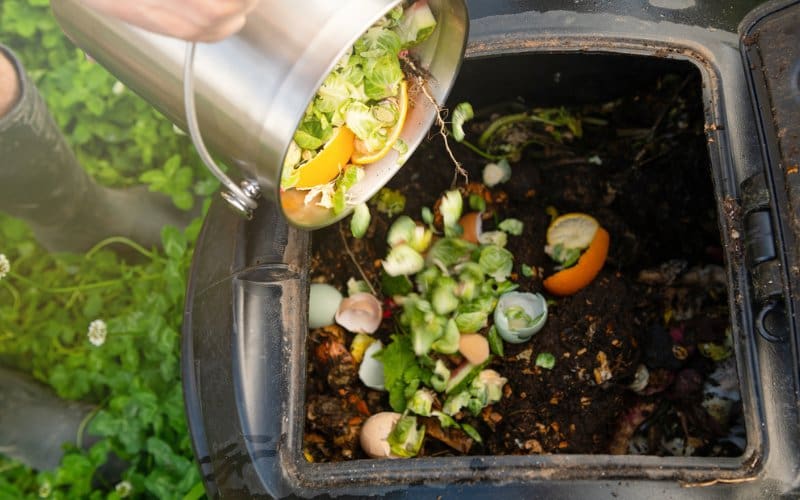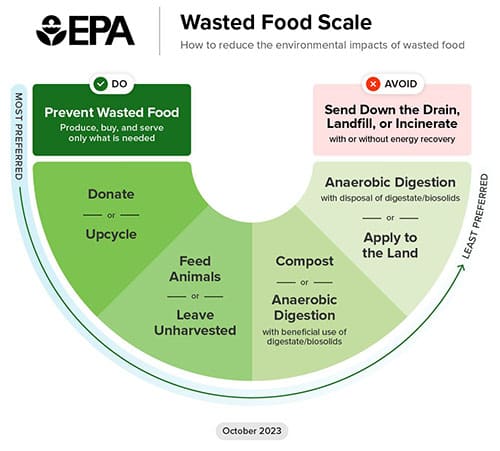
To tackle Connecticut's food waste crisis, we need to make it easier for households to donate or compost unused food. Photo: Shutterstock.
Connecticut has long recognized the importance of keeping food out of the trash. Our state has led the way from piloting a food scrap composting program in the 1990s to passing a food waste prevention law in 2011. But an issue remains. Though the current law applies to large-scale generators (like resorts, supermarkets, and conference centers), it doesn’t include smaller food waste producers (in other words, you, me, and our neighbors) who throw away the most food. There’s a solution: An expanded food waste prevention law that would make it easier for Connecticut residents to compost rather than toss their trash.
The Problem
Connecticut tosses over half a million tons of food annually. That’s disheartening. Unsurprisingly, nationwide food is the most common discard in landfills and waste incinerators – making up about 24% of landfill waste and 22% of trash in incinerators. Our prospects don’t look much better here in Connecticut, where food makes up 22% of the state’s waste.
Right now, state law requires businesses – within 20 miles of a scrap recycling facility – that generate more than 26 tons of food waste annually to keep it out of the trash. And, effective January 2025, the law will apply to more large-scale food waste generators, regardless of how far they are from a scrap recycling facility. Yet, this rule will still overlook a significant source of wasted food: households. While private composting services exist in some places, over 95% of household food waste ends up in landfills, incinerators, and wastewater treatment (through kitchen garbage disposals) facilities every year.
Connecticut is already heading in the right direction when it comes to preventing food waste. So, to truly address this issue, we need to make it easier for households to donate or compost unused food.
What’s at Stake?
People and the environment pay an alarmingly high cost for food waste. For starters, when food waste ends up in the trash, it pollutes our soil, air, and water. In landfills, food scraps release toxic methane emissions – a gas even more damaging to our climate than carbon dioxide. Incineration’s no better. Even worse, tossing food in the trash currently costs residents millions in skyrocketing trash disposal fees – a waste of food and money.
On top of that, as good food goes to waste, food insecurity continues to ramp up across the country. In Connecticut, 1 in 10 people face hunger – including over 83,000 children. And for Black and Latino adults, the rate of food insecurity is 1 in 4. On top of this, disabled individuals, members of the LGBTQAI+ community, and formerly incarcerated people face additional barriers and burdens to accessing food resources across the country. No one should go to bed without dinner. Together, we can be part of the solution.
We have two key problems on our hands – the need to cut toxic emissions and the need to tackle food insecurity. Keeping food waste out of the trash can help us achieve both these goals.
The Solution
No one wastes good food on purpose. But for many of us, it’s not feasible to compost at home or pay for a curbside service. By passing a law to keep household food out of the trash, we will spur new programs that make it easier for us all to donate or compost unused food.
Connecticut must pass a comprehensive food waste prevention and recycling law this year. This law should:
- gradually include all generators of wasted food (ensuring donation and composting options are available to households before they are included in the law),
- prioritize food donation to combat food insecurity,
- protect food scraps from being mixed with toxic materials (like plastic packaging and sewage sludge),
- invest in local and regional food waste prevention infrastructure, services, and public education to make it accessible to everyone, and
- follow best practices for preventing waste outlined
by the EPA’s Wasted Food Scale.

Want to Help?
Contact your legislators and ask them to support a robust food waste prevention bill for Connecticut. There’s no time to waste in preventing food waste.



